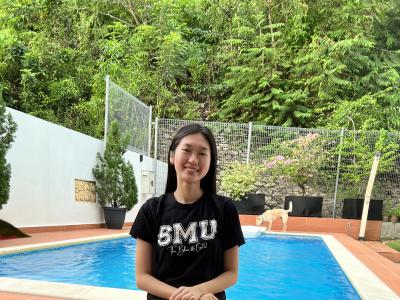
SMU is already synonymous with holistic, interactive tertiary education. But, just like the go-getters that form its student body, SMU is constantly looking ahead to ensure that its graduates are future-ready and have the tools necessary to thrive in any environment. In fact, it has announced some major enhancements to its Undergraduate Curriculum, following a one-year study started in April 2017 by SMU’s in-house Blue Ribbon Commission on Undergraduate Education.
As you go about choosing your university, here’s a look at some of the key enhancements you should know about the new SMU undergraduate curriculum.
1. Integrated Learning
The explosion of new technologies, the disruption economy, and the increasing integration of different disciplines and discoveries is profoundly changing the way we live, work and relate to one another. With such unprecedented scale and complexity of challenges facing the world today, simple one-dimension solutions just don’t cut it anymore; and this why “interdisciplinary” is buzzword that has become synonymous with being future-ready.
SMU’s Core Curriculum, comprising a menu of 12 carefully selected courses units (CUs) that every student is required to complete, has undergone significant changes to ensure a common interdisciplinary and intellectual experience that nurtures students with the depth, breadth and flexibility to answer precisely the challenges of this revolutionary time.
From Academic Year 2019/2020 onwards, the new structure to the Core Curriculum will include three core learning paths:
The Capabilities component (6 CUs) aims to empower students with specific competencies and skills so they can adapt to an increasingly complex, digitised and data-driven working environment. In addition to courses such as ‘Critical Thinking’, ‘Innovation & Creative Thinking’, ‘Business Modelling & Analytics’.
Next is the Communities component (4 CUs), which aims to help students understand the economic, technological and cultural systems in which our actions are embedded and implicated. It also examines more closely Singapore’s society and continental context, as well as the Asian society in general so that students can better appreciate the communities in which SMU is embedded. This component includes courses such as ‘Economics & Society’, ‘Artificial Intelligence & Society’, ‘Digital Cultures’, ‘Urban Cultures’, as well as a selection of foreign languages.
Finally, the Civilisations component (2 CUs) is designed to inspire students to critically address the big questions in life and humanity, and to understand their place and responsibility as global citizens. It comprises of the ‘Ethics & Social Responsibility’ course and the new ‘Big Questions’ course that was launched in August last year to encourage students to think across disciplines and think big, outside of traditional boxes.
More details on the course structure for the three core learning paths here.
2. Enhanced Internship and Community Service Programmes
With the implementation of the Capabilities and Communities components, SMU has incorporated an enhanced credit-bearing internship learning programme and community service learning programme under the two pillars, respectively.
While the existing internship programme prepares students well in terms of pre-graduation work experience and career skills, the enhanced internship learning programme is intended to be more comprehensive and incorporates a more deliberate structure to help students better understand and apply their learning. From AY 2019/2020, students will earn the required 1 CU upon completing an internship of 10 weeks or longer. In addition, the internship requirements will be enhanced to include elements such as a revamped Finishing Touch career-preparatory programme, guided reflection journals and an internship report. Find out more here.
Likewise, 1 CU will now be awarded to students upon completion of the mandatory minimum of 80 hours of community service. The community service programme will also be improved to help students better understand and apply their learning to provide more impactful and sustainable service to the community. Find out more here.
3. Compulsory Global Exposure
Another significant move was for SMU to make overseas experience compulsory for all students. Global exposure has been recognised as an integral part of a student’s tertiary education, giving them invaluable international networking opportunities, skills and vision to be successful in today’s globally connected environment.
Students will have the opportunity to choose from a wide variety of overseas courses and activities include exchanges, study missions, community service, internships, co-curricular activities, and more.
There will be also be range of financial assistance schemes and support made available to students who might have constrains or obstacles preventing them from attaining this global exposure requirement.
For more information, click here.
4. New Work-Study Options
Recognising the value of longer internship durations which enable students to better interlace institution-based learning with structured on-the-job training, SMU will begin pilot-testing a work-study option for selected programmes. This will also facilitate more substantial and impactful work opportunities within the attachment company, and increase the chances of students landing a full-time placement with their internship companies upon graduation.
Students who are on the work-study option will alternate between working at least four days at the host company and studying on campus for up to one day each week, for a period of six months during the academic term. Through this, students will be able to take up to two courses during the work-study period. To ensure that the students deepen their disciplinary knowledge through the work-study experience, they will need to fulfil pre-determined deliverables and key milestones during the period, and will also be mentored by a faculty advisor. This option will be piloted through selected programmes, such as the recently-launched Health Economics and Management second major (a collaboration with SingHealth) and the SMU-Google Squared Data & Analytics Programme.
5. New Exploratory Course Scheme
By now, we would all be hard-pressed not to acknowledge that the future is multidisciplinary. A key step towards promoting multidisciplinary learning is the introduction of the new Exploratory Course scheme where students will have the option to exclude up to two of their passed grades from the cGPA computation (with the exception of the compulsory University Core, Major Core and Track Core courses).
With the introduction of this new scheme, students can now have more flexibility to explore and experiment with courses outside of their usual sphere of interest without the worry of its impact on their GPA.
As SMU works to constantly upgrade and enhance its core curriculum to keep up with the demands of the changing society and its students, the school also recognises the need and responsibility to keep both new and existing students updated on the changes that are being made. Potential applicants and parents can check out the full list of updates and changes to undergraduate curriculums here.
For a concise rundown of the new undergraduate curriculum, check out this video:


